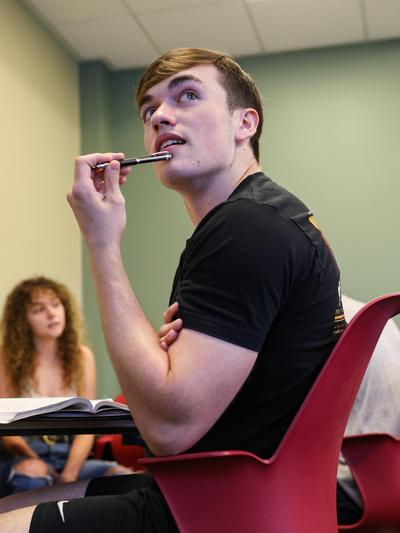MayX Snapshot: Keeping patient care from being lost in translation
This week, we’re highlighting courses from May Experience – a chance for students to explore topics beyond the typical academic year.
COURSE: Beginner Medical Spanish
INSTRUCTOR: Maria Rippon, associate professor of Spanish
DESCRIPTION: Students will be introduced to the specialized vocabulary of the health care professions, such as that needed to take a medical history or conduct a medical examination. The language to discuss pharmaceuticals, nutrition and various infirmities – both mental and psychological – will be introduced and practiced in and out of class. Cultural topics, such as Hispanic names, families, and approaches to health care will also be discussed.
Britany Bonilla-Martinez ’24 knows how a language gap feels.
“I first came to the U.S. when I was 5, and I remember feeling scared, embarrassed and frustrated that I could not express my thoughts and feelings,” said the health sciences major, who was born in Costa Rica. “When patients come into a doctor’s office, they are in a very vulnerable state, and knowing they may not be able to communicate with their provider can be frustrating and an additional stressor for them.”
“It’s such a tense time when you’re sick,” agreed Maria Rippon, an associate professor of Spanish. Since 2014, Rippon has led the MayX Beginner Medical Spanish course with help from her sister, Dr. Mary B. Rippon, a surgical oncologist and clinical assistant professor of surgery at the University of South Carolina School of Medicine Greenville, and Roberto Martinez, manager of language services with Prisma Health Upstate.

Cade Azzariti ’25 during a MayX Beginner Medical Spanish class
Bonilla-Martinez and her classmates spent mornings in the classroom, covering Spanish terms in anatomy, chief complaints, medical exams, diagnostic tests, diet and nutrition. In the afternoons, they rotated through different Prisma pediatric and OB-GYN clinics, as well as the emergency department of Greenville Memorial Hospital, spending three four-hour shifts with language services professionals working with patients.
Financial realities and pandemic restrictions have left less room for in-person interpreters in health care settings, Rippon noted. Translation through a video monitor or over the phone can substitute, but it’s not conducive to what a Spanish speaker would call “personalismo” – described by researchers as “a nuanced Latino cultural construct that refers to a value for interacting with persons with whom one has a warm, caring and trusting personal relationship.” Without personalismo, a care plan may not be followed, Rippon said.
“In Hispanic cultures, if you don’t trust the doctor, you’re not going to follow the treatment,” she said.
Rippon wants her students to leave the class understanding that even making an effort to connect across a language barrier can go a long way toward healing.
“If you can make the attempt and say, ‘Hi, hello, how are you?’ and have the interpreter fill in the gaps, that means so much to a patient,” she said. “When you ask the interpreters what they like about their jobs, they talk about the relief on a patient’s face when they hear someone speaking their native language.”
But patient care goes deeper than bridging a language gap, said Bonilla-Martinez, who is planning a career as a physician assistant.
“It is also about advocating for your patients, taking the time to learn about their culture and creating an atmosphere where they feel comfortable speaking up,” she said. “I need to remember that as a provider, I need to meet my patients where they are.”